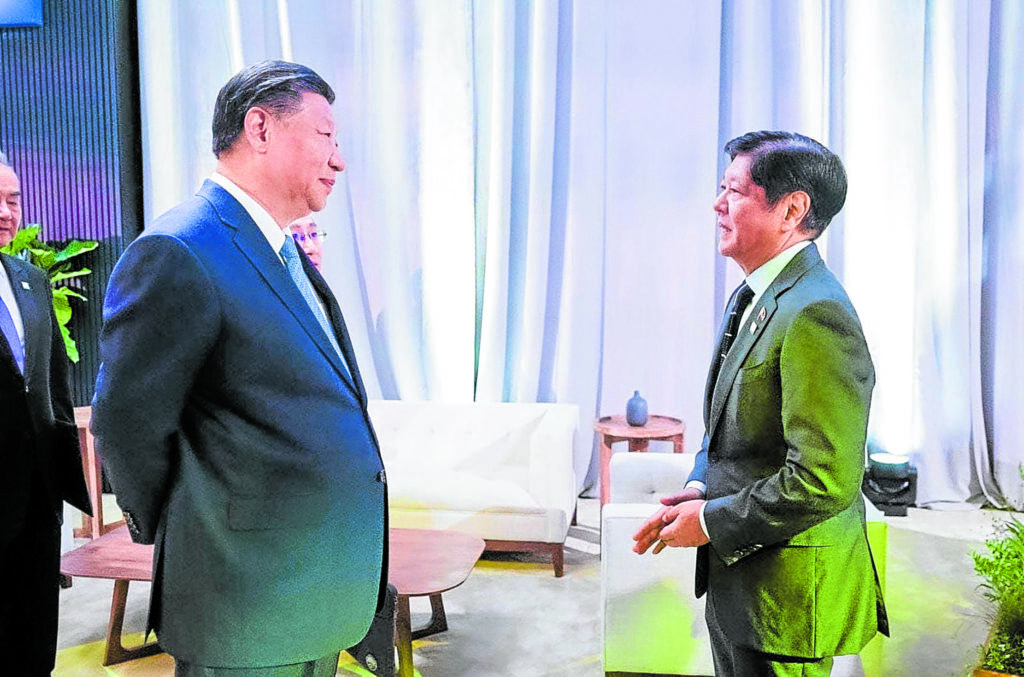Marcos: PH avoiding conflict amid China’s rising threats

‘NOT POKING THE BEAR’ That’s how President Marcos, seen here with Chinese President Xi Jinping during the Asia-Pacific Economic Cooperation Leaders’ Meeting in November 2023, describes Manila’s approach to avoiding military conflict with the Asian giant over the West Philippine Sea issue.—MALACAÑANG PHOTO
President Marcos said on Wednesday that the Philippines will strive to avoid provoking China while addressing its increasing threat in the South China Sea.
However, Manila intends to assert its sovereign rights more assertively in the disputed waters. Marcos emphasized the importance of maintaining a delicate balance between defending maritime rights and preventing conflict in the region during an interview on Bloomberg TV.
READ: Marcos counters China’s demand on sea row: PH didn’t start the problems
The 1951 pact binds the two countries to defend each other in the event of an armed attack.
But Mr. Marcos said he was doing everything in his power to prevent triggering the treaty with the Philippines’ top western ally.
“We are avoiding that, as I said, [because] we think about peace in the national interest. It does not serve any purpose to heighten tensions, to say, ‘Okay, I am invoking the Mutual Defense Treaty,’ and I don’t think anyone wants that… unless the effects are such that… it will become an existential threat to the country,” the President said.
‘More robust defense’
Mr. Marcos acknowledged how the threat posed by China had increased over the years.
“And since the threat has grown, we must do more to defend our territory. That is what people are seeing—a more robust defense of our territorial rights as recognized by the international community and international law,” he said.
Asked how confident he was of the United States defending the Philippines against China, the President exclaimed, “Oh God.”
He then said a war is “precisely what we want to avoid.”
“We want to do everything we possibly can, together with our partners and allies, to avoid the situation. This is not poking the bear, as it were. We are trying to do quite the opposite,” Mr. Marcos said.
The President went on: “We are trying to keep things at a manageable level, to continue the dialogues, whatever they are, at every level…. That’s what we hope to continue.”
Although Washington was “very supportive” of Manila and took the treaty “very seriously,” Mr. Marcos said it was “dangerous” to rely exclusively on the United States for help.
Running to Big Brother
“It is dangerous for one to think in terms of when something goes wrong, we’ll run to Big Brother. That’s not the way we treat it at all. We do this for ourselves. We do this because we feel that we have to do it. And it’s not at the behest of the United States,” the President stressed.
He also assured the public that the country’s military bases would not be used for any offensives against China even with the Philippines-US Enhanced Defense Cooperation Agreement.
“That is the farthest thing from our mind. No, we would not allow that. Unless we are at war, perhaps. But that’s why we want to keep away from that situation as much as we can and maintain that. Maybe you could describe it as an uneasy peace, but it’s peace nonetheless,” he said.
Also on Wednesday, China said the United States must refrain from “stirring up trouble” or taking sides on the South China Sea issue, after US Secretary of State Antony Blinken said a security deal with Manila extended to attacks on the Philippine Coast Guard.
Blinken called the US security commitment with the Philippines “ironclad,” saying Beijing’s actions in the South China Sea had triggered a wider international reaction.
“The recent tension in the South China Sea would not have occurred without the US egging on the Philippines,” the Chinese Embassy in Manila said in a statement on Wednesday.
Reiterating that the United States “has no right to interfere in the maritime issues between China and the Philippines,” the embassy said the US was merely invoking freedom of navigation to justify its military presence in the South China Sea.
‘True hegemon’ in region
“Under its pretext of safeguarding freedom of navigation, the US is actually seeking freedom of rampage of its warships in the region. By going out of their way and far to the doorsteps of China to bluff and stir up the situation, the US warships and military aircraft are demonstrating the true hegemon,” it said.
“It is exactly the US and not anyone else that’s threatening peace and stability in the South China Sea,” the Chinese Embassy said.
In a joint news conference with Foreign Secretary Enrique Manalo on Tuesday, Blinken said the United States’ “ironclad” commitment to the defense pact extended to all its forces including the coast guard “and that will also be anywhere in the South China Sea.”
China has claimed a vast expanse of the South China Sea, including waters that fall within the Philippines’ 370-kilometer exclusive economic zone, which Manila calls the West Philippine Sea.
In 2016, the Philippines won its case against China in the Hague-based Permanent Court of Arbitration, which rejected Beijing’s nine-dash-line claims and favored Manila’s sovereign rights to fish and explore resources in the sea. —WITH A REPORT FROM REUTERS
Disclaimer: The comments uploaded on this site do not necessarily represent or reflect the views of management and owner of Cebudailynews. We reserve the right to exclude comments that we deem to be inconsistent with our editorial standards.
